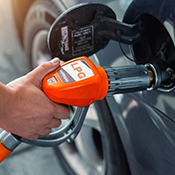
Use Fuel
Vendor
Vendor
A vendor is any person who sells and places, or causes to be placed, fuel subject to use fuel tax into the fuel tank of a motor vehicle.
A vendor can be any of the following:
- Wholesaler
- Retailer
- User who sells fuel to other users
- Operator of any key, cardlock facility, or self-service pump
As a vendor, you are required to obtain both a Vendor Use Fuel Tax Permit and a seller's permit from us. A seller's permit is required because in addition to the use fuel tax, your sales of fuel are generally subject to sales tax when sold at retail.
You can be both a vendor and a user. For example, if you are a wholesaler of fuel who makes bulk sales to end users, retail sales to truck drivers, and you use fuel in your own delivery trucks, you would be required to obtain separate permits and file separate returns as both a vendor and a user.
Vendor Exceptions
Not all fuel retailers qualify as vendors, such as people who:
- Pump fuel exclusively into vehicles registered for the annual flat rate fuel tax. Please see the User tab for more information on this subject.
- Sell fuel only for non-vehicular use, such as a retailer who exclusively sells fuel for home heating, cooking, or lighting.
Vendor Exemptions
You must collect the use fuel tax on fuel you deliver directly into the fuel tanks of motor vehicles, regardless of their location.
However, you are not required to collect the use fuel tax on the following transactions:
CDTFA Authorizations
You are not required to collect use fuel tax on sales of fuel to a user who provides you with a properly completed CDTFA-108, Authorization to Sell Fuel Without Collecting Use Fuel Tax (authorization) in which the user certifies that they are entitled to purchase fuel without paying use fuel tax at the time of purchase. The CDTFA-108 must be signed by an authorized CDTFA representative to be valid.
Such authorizations are issued to those whose vehicles are used:
- Both inside and outside the state, when the user would consistently pay more tax to vendors than is due on the vehicle's overall use.
- Exclusively off-highway. The fuel must be delivered directly into the users' vehicle fuel tanks at the location where the vehicles are operated.
- To provide eligible transit services.
You must retain all CDTFA authorizations in your records and list sales made to users holding CDTFA authorizations on your Vendor Use Fuel Tax Return.
Fuel Pumped into Containers
You are not required to collect the use fuel tax on sales of fuel pumped into containers other than fuel tanks of motor vehicles, including bulk storage tanks, equipment not considered to be motor vehicles, and containers such as fuel cans, drums, or barbecue propane tanks.
U.S. Government Sales
You are not required to collect the use fuel tax on fuel sold for use by the U.S. government or one of its agencies or instrumentalities is not subject to use fuel tax. Fuel pumped into the tank of a U.S. government vehicle is exempt only if purchased with a credit card belonging to the government. If the purchaser pays for the fuel with cash or uses a personal credit card, the fuel is subject to tax.
You must report these exempt sales on your Vendor Use Fuel Tax Return
Annual Flat Rate Fuel Tax
You may make nontaxable sales of LPG, DME, DME-LPG blends, LNG, and CNG to users who have paid the annual flat rate tax, provided the vehicle has a current flat rate decal attached. You should document all such sales on your receipt by recording the taxpayer's permit and decal numbers, the vehicle license numbers, and number of gallons sold.
You are required to list the total number of tax-exempt gallons sold on your Vendor Use Fuel Tax Return.
Reporting and Documenting Nontaxable Sales
You are required to report all nontaxable sales on your Vendor Use Fuel Tax Return.
To support nontaxable sales reported on your returns, you should retain the following documents:
- Copies of the sales receipts issued to the customers.
- Certificates provided to you by your customers for the purchase of tax-exempt fuel.
The receipts should include:
- Your name and address,
- The name of the purchaser,
- Date of sale,
- Gallons or units of fuel sold,
- Price per gallon or unit,
- Amount of use fuel tax collected,
- Total amount of the sale, and
- A statement or code indicating the reason the sale is not taxable.
For fuel sales of less than 250 gallons that you pump into containers other than motor vehicle fuel tanks, you should note the type of container into which you place the fuel (for example, storage tank, bulldozer fuel tank, or drum, among others). The notation may be either a description or a machine code.
If a receipt covers multiple deliveries of fuel and only some were taxable, you must indicate the exempt deliveries.
